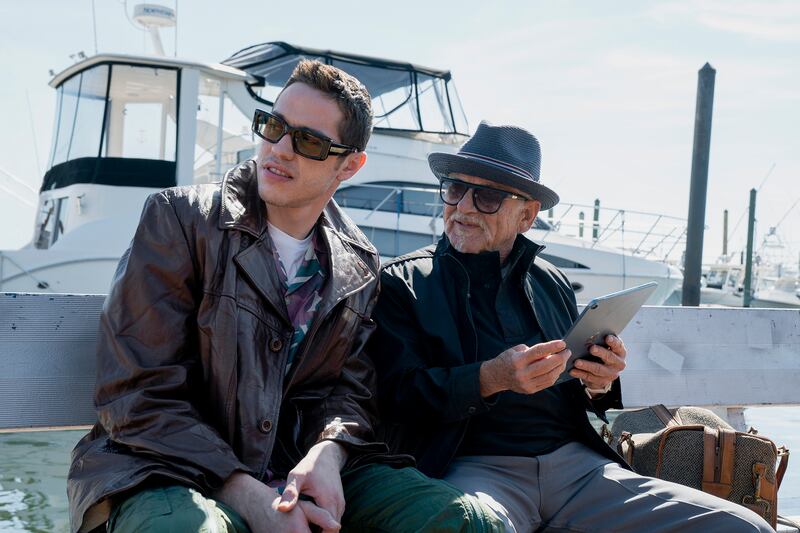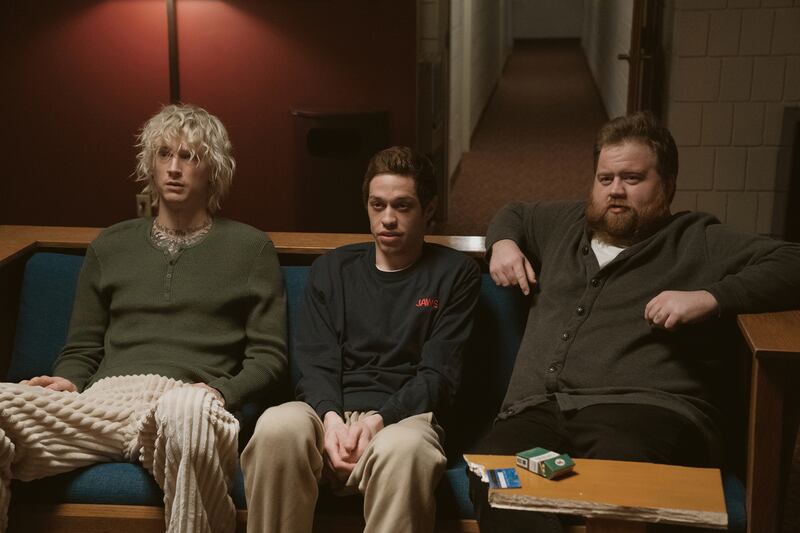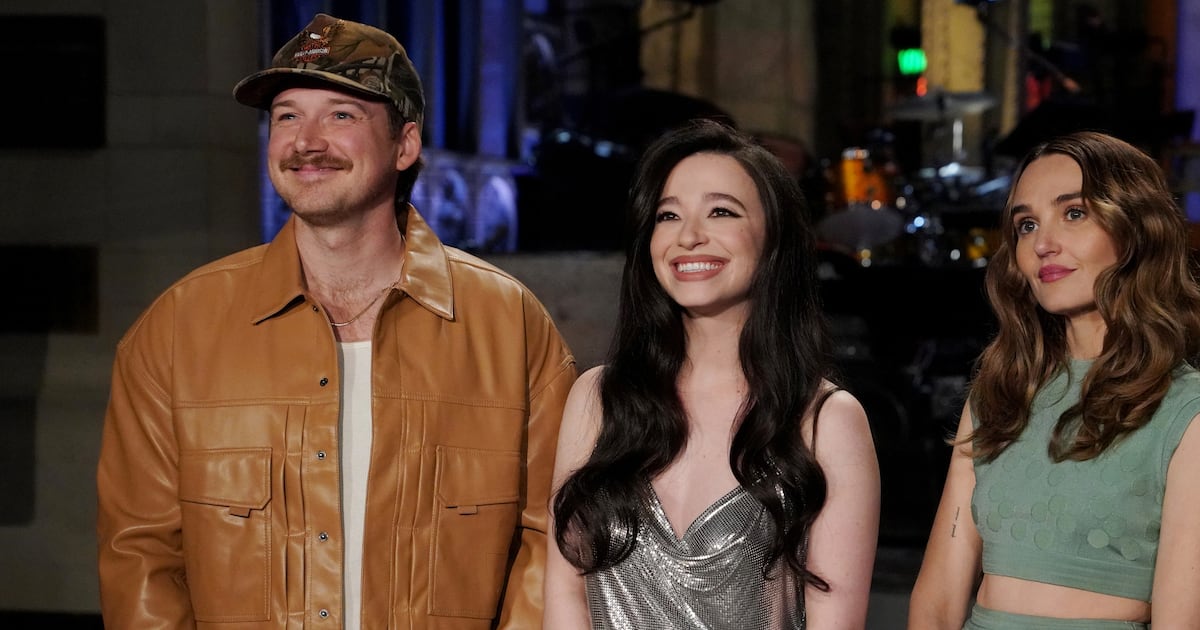Pete Davidson knows that you’ll likely be coming to his new Peacock original series, Bupkis (from May 4), with some preconceived notions. In fact, he welcomes those biases. The premiere opens with Davidson Googling himself, the search delivering a deluge of absurd headlines. Some are just fake enough to arouse suspicion (“12 Things Horribly Wrong with Pete Davidson”), and others are shockingly real (“Pete Davidson and the Rise of the Scumbro”). Right out of the gate, Bupkis takes aim at its viewers, asking us to reflect upon which of these we may have seen, and which ones we may have even agreed with.
Some might try to defy this trick, to place themselves above the gossip that likely brought Davidson into their pop-cultural consciousness in the first place. The show has plans for how to address them too, ending its cold open with a scene so surprisingly grotesque that it’s begging viewers to sympathize with the most vicious of headlines. Throughout its eight-episode first season, Bupkis consistently straddles this line of reality in its (lightly fictionalized) portrayal of Davidson’s life and the whirlwind that surrounds his brand of stardom, with a surprising amount of candor and depth.
The show, on which Davidson serves as an executive producer and writer, initially appears to be an unnecessary retread of 2020’s The King of Staten Island. That film similarly had a semi-autobiographical sheen all over it. Though critics and audiences responded to it favorably, it felt like another standard dose of director Judd Apatow’s now-archetypal style and screenwriting. Ultimately, the film failed to properly dissect the perplexing charm of its titular king.

Bupkis solves this by letting Davidson be Davidson—and do it with all of his amiably grody allure. By playing a version of himself, Bupkis examines how Davidson’s existence has come to blur celebrity and civilian, hinting at the occasional kernels of truth somewhere in that mess of it all. Playing amateur detective is part of the fun of Bupkis, and so is getting thrown off the scent of which parts draw from Davidson’s reality by one of the endless celebrity cameos along the way. These moments are designed to make us briefly forget that this show features the comedian in his most sincere role yet.
That sincerity might come as a surprise, considering that aforementioned repulsive opening sequence, but it’s true. Helping to extract the more earnest sides of Davidson are Edie Falco, who plays Pete’s mother, and Joe Pesci, as his grandfather. In the series, Pete lives with his mother in Staten Island; or, rather, his mother lives with him, a true facet of his life that Davidson has drawn from in his comedy. This doesn’t provide the typical mom-son strife and in-fighting, so much as offer the series a grounded character, who often inadvertently helps Pete end up in the nutty situations he so often does, thanks to her love and undying support.
These whacked-out scenarios don’t always present themselves in the most coherent of ways. For instance, the fourth episode’s take on The Fast and the Furious, by way of a raucous trip to Florida—where Pete has to perform a set for Vin Diesel’s daughter without getting photographed doing something illicit, or risk losing a role in the Fast franchise—is damn near insufferable. Yes, even an outrageous cameo by Simon Rex (an actor who most writers can’t seem to properly understand the appeal of, much like Davidson) can’t save it.
At other times, Bupkis will come out swinging, with storylines plucked directly from Davidson’s own experiences that hit like a bat to the face. It’s disarming; who would’ve expected to shed tears over Pete Davidson’s Peacock comedy series? But the unpredictable nature of Bupkis is actually what keeps the show engaging. The second episode may leave you in tatters, while another may threaten to put you off completely. It’s that gamble of which one you might get, when you hit play, that keeps up Bupkis’ appeal. The less-than-half-hour runtimes of most episodes won’t hurt on that front, either.
While the tonal inconsistency will surely prove grating to some, Falco and Pesci ensure that this dissonance never hinders the show entirely. Falco is purely delightful here, bringing the necessary energy of a born-and-bred New York matriarch to the show. At one moment, she’s hilariously overzealous, pushing Pete to find a surrogate and have kids at his mere mention of wanting to be a dad. At others she’s helping the series craft its dozens of metatextual layers, screaming, “Marisa Tomei played me in [The King of Staten Island],” at a waiter trying to kick her out of a restaurant. Bupkis is at its best when Falco is allowed to play around. When episodes focus too much on Pete and his stagnant, nearly all-male crew of friends, you’ll wish for just a sprinkle of Falco’s kinetic energy.
Pesci, however, is Falco’s perfect opposite. Pete’s grandfather—or Poppy, as they so lovingly call him—is abrasive and foul-mouthed, the type of crotchety Staten Island resident that will happily light up a cigarette inside a diner without a second thought. Every time Pesci’s got the great talent of making every stray “fuck” that flies out of his mouth sound completely unscripted. And maybe it is! Part of Bupkis’ unanticipated charm is how natural it feels, despite the storytelling often verging on the farcical. That’s exactly why the episodes that aim for something too grandiose often feel like the most hollow entries, for a show that is at its strongest when it stays close to its partially autobiographical conceit.

If Bupkis is to be believed, Davidson is the rare celebrity who actually has a clear vision of how the world perceives him, but he has an even more apparent perception of his own self. In colliding these two states, Davidson gets the chance to fire back at the media in a constructive way, while working through his own struggle with being one of their favorite subjects to lampoon.
Davidson plays himself with just the right amount of honesty, tackling his own real-life troubles with aplomb. When Bupkis studies the idea of fame—and particularly what it’s like to be saddled with the knowledge that the whole world has seen you fuck up—it’s at both its funniest and most effective. Even if the amount of truth between the lines of the scripts actually proves to be microscopic, the show lends some necessary grace to Davidson’s image. For that reason alone, Bupkis is a fascinating watch, even if it’s just to determine how much is real and how much is, well, bupkis.







